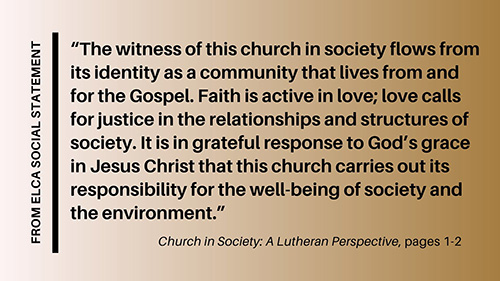|
In the last several days, leaders in Congress have been debating which federal resources and international policies our communities still need to adequately address the impacts of COVID-19, and how to strengthen the economy. Two things are clear: more work is needed, and our advocacy is making a difference. Our leaders must reinforce safety-net protections and economic programs, and shift focus on an infrastructure bill to restart U.S. construction, create jobs and strengthen dignity in the workforce. If correctly informed, this federal response could be critical for our churches and partners on the front lines of addressing these impacts for ourselves, for our communities and for the stability of our global neighbors and allies.
 As negotiations continue, lawmakers urgently must hear from faith-based advocates. Houses of worship, service agencies and nonprofits are leading in unprecedented ways to address the devastating impacts of the coronavirus: providing food, shelter and other critical services to those of us in the greatest need. As more workers are left without employment, our role to care for our community and each other is more visible than ever. Those of us who typically fall through the cracks of other safety nets and public assistance programs require advocacy as decisions are being made. Our advocacy will be especially essential alongside people of color and people with low incomes and any of us whose lives are disproportionately disrupted by closures, job loss and sickness. As negotiations continue, lawmakers urgently must hear from faith-based advocates. Houses of worship, service agencies and nonprofits are leading in unprecedented ways to address the devastating impacts of the coronavirus: providing food, shelter and other critical services to those of us in the greatest need. As more workers are left without employment, our role to care for our community and each other is more visible than ever. Those of us who typically fall through the cracks of other safety nets and public assistance programs require advocacy as decisions are being made. Our advocacy will be especially essential alongside people of color and people with low incomes and any of us whose lives are disproportionately disrupted by closures, job loss and sickness.
Below are several critical issues under discussion that intersect with ELCA advocacy priorities. Please consider your experiences, faith reflections and the issues that are most important for your congregation and community, and highlight them in a customized message to Congress through the ELCA Action Center.
- U.S. HUNGER RESPONSE: In any economic crisis, the risk of hunger always increases in our communities as unemployment and financial hardships rise. Congress in previous COVID-19 related support bills has provided money for Supplemental Nutrition Assistance Program (SNAP) food assistance programs to address hunger– but only enough to temporarily keep existing benefits afloat for the coming weeks.
- Congress should temporarily increase the maximum SNAP benefit by 15 percent during the duration of this emergency to ensure households have enough resources to avoid the hard choice of choosing between paying for their bills or for food. Congress did this during the 2008 economic crisis.
- INTERNATIONAL RESPONSE: Congress has authorized $2.37 billion in emergency funding to help countries respond to the COVID-19 pandemic, for which we are grateful. To be administered by the Department of State and USAID, these funds will support diplomatic and global health programs, provide international disaster and refugee assistance, and support countries' economic and stability programs.
- Because of the scale of this global crisis, more resources are needed to address the needs of vulnerable communities around the world. The next COVID-19 bill must include addition funding resources in international assistance to ensure effective global responses that will protect all of us here at home and around the world.
- MIGRATION RESPONSE: The national coronavirus stimulus package that was passed by Congress didn’t include migrant workers, documented or undocumented, which is a significant flaw since so many of these workers fill “essential” roles including on the front lines of the coronavirus pandemic. This also means that even though they pay $12 billion in taxes every year, undocumented immigrant workers will not receive any of the benefits from the $2 trillion dollar package. Immigrants, including individuals with Deferred Action for Childhood Arrivals (DACA) and Temporary Protected Status (TPS), are among the doctors, nurses and medical staff in hospitals. They are the farmworkers picking and processing our food. They are the tech workers supporting our telework needs. They are the construction workers building hospitals and other health care spaces, and they are the janitors and housekeepers keeping our spaces clean and sanitized.
- The next COVID-19 bill must expand access to care to ensure all immigrants can access medical testing, treatment and needed assistance, regardless of citizenship or insurance status.
- Additionally, establishing multilingual COVID-19 hotlines through the 211 system, with capability and clinical backup to triage calls from symptomatic people, could bridge the gap to care for those lacking a primary care provider.
- FARMWORKER FOCUS: Earlier COVID-19 stimulus left many farm workers out of paid sick leave or unemployment insurance, especially those still laboring during the pandemic who are “essential” but may be unprotected and undocumented. Paying for a COVID-19 test can be cost prohibitive, especially for low-paid undocumented farmworkers who already face difficulties in accessing healthcare, although conditions in the agricultural environment can make preventative measures very difficult.
- Farmworkers should be eligible for paid sick leave or unemployment insurance in all states.
- All workers, regardless of their immigration status, should be afforded free testing to determine whether they have COVID-19 as well as necessary medical care.
- Precautionary measures in the agricultural setting should be supported, including: precautionary face masks and gloves; soap and water access in the fields, bathrooms and bathing facilities; separate housing for those who get sick; and job security for those who experience illness or self-quarantine.
- CHILDCARE PROVIDER FOCUS: While childcare facilities were not originally listed as examples of small business recipients, they are among the most important in surviving the widespread closures of business due to COVID-19. Families require childcare in order to return to work.
- Microgrants for childcare facilities will enhance sustainability of these enterprises and ensure the integral availability of childcare providers in facilitating U.S. economic recovery.
- IMMIGRATION DETENTION FOCUS: Positive results of COVID-19 are occurring in federal detention centers, including among minors. Prior deaths from influenza in these facilities highlight challenges for care in a strained, tenuous infrastructure and conditions threatening for human life in this pandemic outbreak. Under public pressure, U.S. Immigration and Customs Enforcement (ICE) announced on March 18 that its “highest priorities are to promote life-saving and public safety activities,” and that it will therefore focus detention efforts on those posing a public safety risk and “delay enforcement actions until after the crisis or utilize alternatives to detention, as appropriate” (www.ice.gov/COVID19).
- Reducing the number of people in detention as soon as possible would ease the threat. Releasing low-flight-risk detainees who are in custody would promote lifesaving.
- ELECTIONS FOCUS: Over the past several weeks, over a dozen states have deferred or adjusted their local elections due to stay-in-place orders.
- Many states need additional funding for voter registration, absentee voting and other election costs to ensure that the integrity of our democracy is not impacted by the coronavirus crisis.
- CHARITABLE CONTRIBUTION FOCUS: As many houses of worship, charities, and service groups continue services for people in the greatest need, Congress can encourage direction of additional resources for these currently active ministries and non-profit organizations on the scene. This encouragement could counteract declines in contribution by households experiencing economic strain.
- Allow taxpayers to deduct much more than $300 in charitable contributions would immensely help churches continue their service work in our communities.
- HOUSING RESPONSE: Congress provided an initial $4 billion in Emergency Solutions Grants (ESG) in the CARES Act for short term homeless program costs, but minimal additional funds were designated for rural housing programs. In rural and other areas, persons experiencing homelessness face daunting risk from COVID-19. Initial reports indicate that people who are experiencing homelessness and contract COVID-19 are much more likely to be hospitalized and require critical care than the general public.
- Additional funding is needed for rural housing programs.
- Additional housing funding and a broadened freeze on evictions could also help prevent homelessness and save costs in the long run.
Take time today to make a difference and contact your lawmakers on our most urgent needs at the ELCA Action Center. Personalize a message to your members of Congress using the content above to highlight your greatest concerns, and what you think should be included in an equitable federal response.
ORIGINAL POST DATE: 4/15/2020
(To view this message in your web browser, click here).

|


 As negotiations continue, lawmakers urgently must hear from faith-based advocates. Houses of worship, service agencies and nonprofits are leading in unprecedented ways to address the devastating impacts of the coronavirus: providing food, shelter and other critical services to those of us in the greatest need. As more workers are left without employment, our role to care for our community and each other is more visible than ever. Those of us who typically fall through the cracks of other safety nets and public assistance programs require advocacy as decisions are being made. Our advocacy will be especially essential alongside people of color and people with low incomes and any of us whose lives are disproportionately disrupted by closures, job loss and sickness.
As negotiations continue, lawmakers urgently must hear from faith-based advocates. Houses of worship, service agencies and nonprofits are leading in unprecedented ways to address the devastating impacts of the coronavirus: providing food, shelter and other critical services to those of us in the greatest need. As more workers are left without employment, our role to care for our community and each other is more visible than ever. Those of us who typically fall through the cracks of other safety nets and public assistance programs require advocacy as decisions are being made. Our advocacy will be especially essential alongside people of color and people with low incomes and any of us whose lives are disproportionately disrupted by closures, job loss and sickness. 